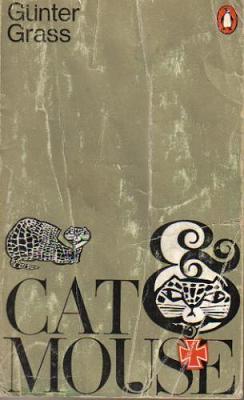Günter Grass: Cat and Mouse

October, 2013
This novella opens:
…And one day, after Mahlke had learned to swim, we were lying in the grass, in the Schlagball field. I ought to have gone to the dentist, but they wouldn’t let me because I was hard to replace on the team. My tooth was howling. A cat sauntered diagonally across the field and no one threw anything at it. A few of the boys were chewing or plucking at blades of grass. The cat belonged to the caretaker and was black. Hotten Sonntag rubbed his bat with a woollen stocking. My tooth marked time.
Which is just great. Unfortunately the plot, in particular the ending, left me ambivalent, mainly because I feel like there is something the author was trying to tell that I missed.
Pilenz, our narrator, recalling the past, tells the story of his friend Mahlke. Starting for when they were in their early teens to sometime during WWII when Mahlke, serving in the Panzer Division, while on leave, goes missing.
Mahlke, dubbed the “Great Mahlke” by the Pilenz, is an enigma: among his childhood friend, and afterwards, among his fellow cadets, his exploits, observed and rumoured, generate a mythology around him. He possesses great physical and sexual prowess and also a fervent, though unconventional religiosity.